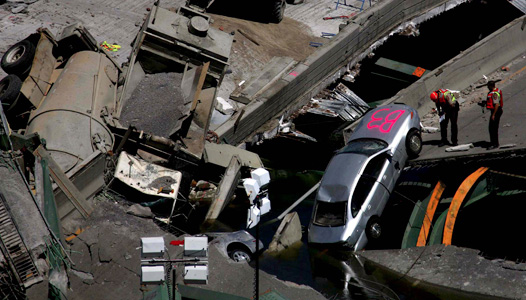
WASHINGTON (PAI) — Minnesota Democratic Rep. Tim Walz is trying to haul the highway-mass transit bill out of the congressional partisan ditch – and he may have done so in a way the House’s ruling Republicans don’t realize will help workers.
The third-term lawmaker, an Education Minnesota member, was also a National Guard veteran who served in Italy for Iraqi operations support. He’s on the House committee that’s been working – or not – on a new law to OK continuing the gas tax and approving highway and mass transit projects nationwide.
Highway-mass transit legislation is important. With joblessness in construction in the double digits, with unrepaired bridges literally falling down and with over-jammed buses and subways breaking down, the bill would create thousands of jobs fixing them.
But the House GOP, pushed by its tea party wing, shoved through a highway-only bill earlier this year. Mass transit’s dedicated share of gas tax money was eliminated but some controversial provisions were added. The big hang-up: Their insistence on building the Keystone XL oil line from the U.S.-Canada border to the Texas Gulf Coast.
The Senate didn’t even bother with the House scheme and approved a 2-year $106 billion measure by a bipartisan 74-22 vote. It doesn’t have Keystone, it does have the mass transit gas tax money share and it would put tens of thousands of construction workers to work. But congressional negotiators haven’t agreed on a compromise, yet.
Construction unions are lobbying hard for the Senate bill. “One in four bridges in the U.S. is structurally deficient or obsolete. The average bridge is 45 years old, dangerously close to the average bridge lifespan of 50 years,” says Laborers President Terry O’Sullivan.
“Yet Republicans in the House are mired in political gamesmanship and blocking adoption of a bipartisan Senate solution. What they offer at best is a highway bill extension that is nothing more than duct tape for a bridge crisis that is threatening safety, jobs and our economy.”
The union has even taken the unusual step of asking GOP House Speaker John Boehner, in a series of radio ads “How many people do you imagine will have to die before we repair our crumbling infrastructure?”
Enter Walz. With the House and the Senate trying to hash out their differences, so far unsuccessfully, he gave them a shove. The House backed his shove on June 20.
The day before, Walz introduced a “motion to instruct conferees” to act. In simple language, he told House and Senate bargainers to solve their differences by June 22, and send back a joint bill lawmakers could debate and vote upon before the end of this month, when the present temporary highway bill runs out.
The kicker: Walz says that if the two sides can’t agree, the House would then get an up-or-down vote on the Senate bill, the following week.
“What this motion to instruct asks is: Rectify the differences and compromise to the point that we can get something on the floor and finish the work by June 22, this Friday,” he said in the June 19 debate. “Then give us the opportunity to exercise the American will by having their representatives discuss what needs to be there.
“If we can’t come to a compromise, bring us the Senate bill and let’s have the up-or-down vote. If it passes, we can move forward. If it doesn’t, then we start and go on from there. But I have to tell you, we can’t afford to kick this can down the road-and I would say the proverbial ‘crumbling road.'”
In the debate, nobody opposed Walz’ motion, though the GOP participants claimed the Democratic-run Senate didn’t even consider their legislation. And Walz’ instructions to the bargainers passed 398-34, with all 34 “no” votes from Republicans.
Photo: The scene a day after the Interstate-35W bridge collapsed into the Mississippi River, in Minneapolis, Aug. 2, 2007. Jim Gehrz/Minneapolis Star Tribune/AP












Comments